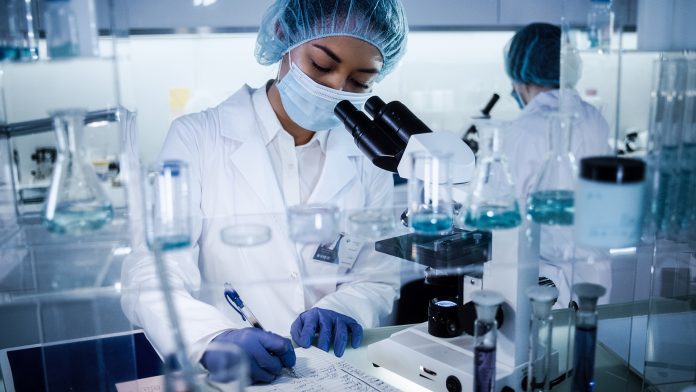
The University of Cambridge has developed a new covid vaccine that is administered by a needle-free ‘injection’ – a blast of air that delivers it into the skin.
Developed by Professor Jonathan Heeney at the University of Cambridge and spin-out company DIOSynVax, this new Covid vaccine can be administered by a blast of air, delivered directly into the skin.
This is an alternative option for individuals who fear needle-based jabs and, if successful, could be manufactured as a powder to boost global vaccination efforts, particularly in low- and middle-income countries.
Safety trials are underway at the NIHR Southampton Clinical Research Facility.
How the new covid vaccine works
SARS-CoV-2 uses ‘spike’ proteins on its surface to gain entry to host cells. These proteins bind to ACE2, a protein receptor on the surface of cells in our airways, allowing the virus to release its genetic material into the host cell.
A vaccine informs our bodies about what dangerous infections look like and how to respond to them. This is a safer approach than becoming infected with the live virus, as it avoids the life-threatening effects the virus could have. Immunisation supports our immune system in blocking the virus or destroying cells that carry the spike protein, protecting us from COVID-19 disease.
Yet, due to SARS-CoV-2 constantly adapting, it can result in the immune system no longer recognising the vaccine.
To find a solution for this, the Cambridge researchers looked for new types of antigens – key regions of the virus – that are the same across coronaviruses that occur in nature, including in animals that carry them, such as bats.
Whilst many Covid vaccines use the sequence of the RNA for the virus spike protein from the first isolated samples of the COVID-19 virus in January 2020; the new DIOSvax technology uses predictive methods to encode antigens like the spike protein that mimic the wider family of coronavirus antigens, thus giving wider protection. The body’s immune cells take the vector, decode the DIOS-vaccine antigen, and present the information to the immune system. This produces neutralising antibodies, which blocks the virus infection, and T-cell, which remove the virus-infected cells. This technology is well-established and the vaccine plasmid DNA does not get taken up into human genetic material.
Professor Heeney added: “DIOS-CoVax vaccines target elements of the virus structure that are common to all known ‘beta-coronaviruses’ – those coronaviruses that are the greatest disease threats to humans. These are structures that are vitally important to the virus life cycle, which means we can be confident that they are unlikely to change in the future.
“These next generation DIOSvax vaccines should protect us against variants we’ve seen so far – alpha, beta, delta variants, for example – and hopefully future-proof us against emerging variants and potential coronavirus pandemics.”
This new covid vaccine can be delivered pain-free without a needle into the skin, using the PharmaJet Tropis® intradermal Needle-free Injection System, which delivers the vaccine in less than a tenth of a second by spring-powered jet injection.
Safety trials begin
The first trial of the DIOS-CoVax is being delivered by the NIHR Southampton Clinical Research Facility. The trial team are looking for healthy volunteers aged between 18 and 50 in the Southampton area. Additionally, participants must have had both doses of a COVID-19 vaccine, but not their booster.
Professor Saul Faust, Clinical Chief Investigator and Director of the NIHR Southampton CRF, said: “This isn’t simply ‘yet another’ coronavirus vaccine as it has both COVID-19 variants and future coronaviruses in its sights. This technology could give wide-ranging protection to huge numbers of people worldwide.
“The people of Southampton and Hampshire have stepped up time and again to help find the vaccines that have unlocked the pandemic. We’re asking for their help again in developing this potentially game-changing vaccine.”










